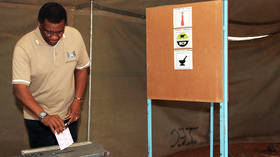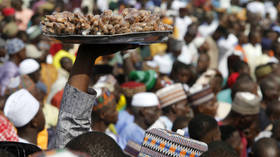Diamond-rich African nation voting on fate of long-ruling party

Botswana is holding an election on Wednesday in which the ruling party is seeking to extend its nearly six-decade hold on power in the southern African nation. Voters will determine the composition of the national assembly, which will then elect the president.
The Botswana Democratic Party (BDP) has ruled the mineral-rich country since its independence from Britain in 1966. Three opposition candidates are running against President Mokgweetsi Masisi, who hopes to win a second and final five-year term in office.
More than a million people are registered to vote in the 2.5 million-strong country, according to the electoral commission. The country’s economic woes are being cited the most pressing issue for voters.
The landlocked state is the world’s second-largest producer of diamonds after Russia. Despite having one of the highest living standards in Sub-Saharan Africa, Botswana is experiencing financial difficulties, primarily as a result of a decline in gemstone trading and mining, on which its economy depends. In July, the International Monetary Fund lowered the country’s 2024 growth forecast to 1%, from its earlier estimate of 3.6% made in April, citing a contraction in the global diamond market.
According to World Bank data, the country’s unemployment rate rose to a record 27.6% in the first quarter of this year, and it has among the worst inequality in the world.
Opposition parties have blamed the ruling BDP for the challenges. The party was once credited with overseeing the rapid transformation of one of the world’s poorest countries after independence into a fast-growing economy.
“We are concerned about issues of employment and wage structures,” Karabo Manguba, a 29-year-old local, told AP after voting early Wednesday morning.
President Masisi has claimed that the Covid-19 pandemic disrupted his government’s plans to create jobs and improve the economy, acknowledging the need for policy changes during his campaign. He has promised to prioritize increasing agricultural output and mineral processing if he wins.
“We have listened intently to the voices of all Batswana [people of Botswana] and crafted a manifesto that directly responds to their needs with realism and sincerity,” AP quoted Lebogang Kwape, the party’s deputy secretary-general and current foreign minister, as saying.
Duma Boko, the candidate for the coalition Umbrella for Democratic Change and the incumbent president’s main challenger, has promised to more than double the minimum wage and increase social benefits.
Masisi, a 63-year-old former high school teacher, first came to power in 2018 through a planned transition after his predecessor, Ian Khama, completed the maximum term of ten years in office allowed under the constitution. Masisi was reelected in 2019. He previously worked as a UNICEF Education Project Officer, where he was in charge of policy and program reforms in Botswana.













